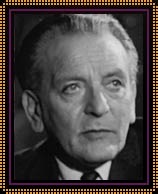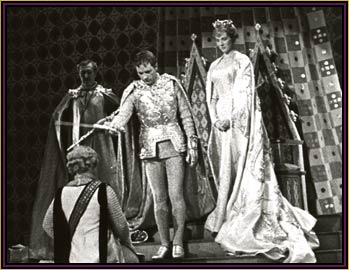 A distinguished composer for the musical theater, Loewe was born into a musical family (his father was a professional singer). He studied piano as a child, appearing with the Berlin Symphony Orchestra in 1917. In 1924, he visited the USA, but was unable to find work in a classical environment. Instead, he eked out a living playing piano in restaurants and bars, then roamed throughout the USA, tackling a variety of jobs, including boxing, prospecting, and cowpunching. As a young teenager he had written songs, and he resumed this activity in New York in the early ’30s. Later in the decade he contributed to various musical shows, and in 1942 began to collaborate with lyricist Alan Jay Lerner. Their first Broadway score was for “What’s Up?” in 1943, which was followed two year later with “The Day Before Spring.” From that point onward, they wrote the music and lyrics (Lerner also contributed the librettos) for some of the most memorable productions in the history of the American musical theater. They had their first hit in 1947 with “Brigadoon,” from which came “The Heather on the Hill,” “From This Day On,” and “Almost Like Being in Love,” and the association was renewed in 1951 with “Paint Your Wagon,” containing such lovely songs as “They Call the Wind Maria,” “I Talk to the Trees,” and “Wand’rin’ Star.”
A distinguished composer for the musical theater, Loewe was born into a musical family (his father was a professional singer). He studied piano as a child, appearing with the Berlin Symphony Orchestra in 1917. In 1924, he visited the USA, but was unable to find work in a classical environment. Instead, he eked out a living playing piano in restaurants and bars, then roamed throughout the USA, tackling a variety of jobs, including boxing, prospecting, and cowpunching. As a young teenager he had written songs, and he resumed this activity in New York in the early ’30s. Later in the decade he contributed to various musical shows, and in 1942 began to collaborate with lyricist Alan Jay Lerner. Their first Broadway score was for “What’s Up?” in 1943, which was followed two year later with “The Day Before Spring.” From that point onward, they wrote the music and lyrics (Lerner also contributed the librettos) for some of the most memorable productions in the history of the American musical theater. They had their first hit in 1947 with “Brigadoon,” from which came “The Heather on the Hill,” “From This Day On,” and “Almost Like Being in Love,” and the association was renewed in 1951 with “Paint Your Wagon,” containing such lovely songs as “They Call the Wind Maria,” “I Talk to the Trees,” and “Wand’rin’ Star.”

Richard Burton and Julie Andrews as Arthur and Guenevere in Lerner and Loewe's "Camelot."
In 1956, the team had a major triumph with the legendary “My Fair Lady,” which ran on Broadway for 2,717 performances. The score included such lasting favorites as “On the Street Where You Live,” “Get Me to the Church on Time,” “With a Little Bit of Luck,” “Wouldn’t It Be Loverly?,” “The Rain in Spain,” “Why Can’t the English?”, “I’m an Ordinary Man,” and “I Could Have Danced All Night.”
Frederick Loewe
- "Brigadoon"
- "Cameot"
- "Gigi"
- "My Fair Lady"
- "Paint Your Wagon"
- Julie Andrews
- Kitty Carlisle Hart
- Moss Hart
- Michael Kidd
- Alan Jay Lerner
- Agnes de Mille
Source: Biographical information provided by MUZE. Excerpted from the ENCYCLOPEDIA OF POPULAR MUSIC, edited by Colin Larkin. © 2004 MUZE UK Ltd.
Photo credits: Photofest

